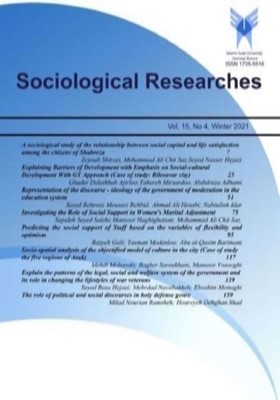Explaining barriers of Development with emphasis on social-cultural development with GT approach (Case of study: Bilesavar city)
Subject Areas :
Ghader Dolatkhah Ajirloo
1
,
Tahereh Mirsardoo
2
*
![]() ,
Abdolreza Adhami
3
,
Abdolreza Adhami
3
![]()
1 - PhD Student, Department of Sociology of Socioeconomic Development, North Tehran Branch, Islamic Azad University, Tehran, Iran
2 - Associate Professor, Management Department, Central Tehran Branch, Islamic Azad University, Tehran, Iran. (Corresponding Author): t.mirsardoo56@gmail.com
3 - Associate Professor, Management Department, North Tehran Branch, Islamic Azad University, Tehran, Iran
Keywords: موانع فرهنگی- اجتماعی, توسعه, development, underdevelopment, توسعه نیافتگی, شهر بیله سوار, socio-cultural barriers, Bilesavar city,
Abstract :
Development requires change, and development that seeks to improve the society will not occur without profound changes in socio-cultural structures. The present article explains the obstacles to the underdevelopment of the city of Bilesavar by emphasizing socio-cultural development and the understanding and interpretation of the people involved and natives of this region of development. The study method of this research is qualitative and grounded theory has been used to analyze and present the data. In this research, observational and documentary information was collected by the researcher and interview information was provided with 14 university professors, managers and experts in the social and cultural areas of the city have been collected. To determine the interviewees, qualitative-purposeful sampling method and theoretical saturation logic were used. Based on the findings, the causal conditions of this study were identified as ethnic and tribal context, lack of elitism, dependence on government and weakness of social capital. Ecological problems and low investment are also classified in terms of inpatient or underlying conditions. Unbalanced development, which includes other categories, was abstracted as the core category of this study, and conflict with the status quo and adaptation to the prevailing conditions as a category of interaction or strategy that perpetuates underdevelopment, poor quality of life and migration, consequences of such actions and reactions. The results of data analysis of the present study and the proposed background model show that the people of Bilesavar interpret the causes of underdevelopment as uneven and uncoordinated development that these unbalanced elements in general and along with each other have caused the phenomenon.
_||_

